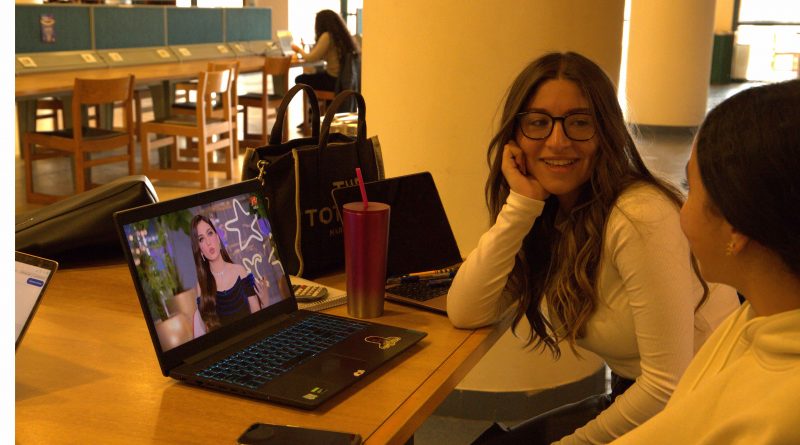Freedom of Expression or Offensive Misogyny?
Reporter: Passant Shehata @passantkshehata
Photographer: Omar Awad
“It is not right for a wife to call her husband directly by his name. Rather, she should glorify him and call him sir.”
Egyptian TV host Yasmine Ezz’s statement on the MBC Masr network’s Kalam El Nas (The People’s Talk) show in January may have been intended as advice on marital relations, but for local social media pundits, her viewpoints were seen as controversial and inflammatory.
Feminists, journalists, and some of her audience argued that her speech is offensive to women suffering from relatively high rates of domestic violence.
According to the Egyptian Central Agency for Public Mobilization and Statistics (CAPMAS), 31 percent of Egyptian women were subjected to violence by their spouses in 2021. These numbers are reported cases only with much more unreported every day.
President of the Egyptian National Council for Women Maya Morsi described in a Facebook post-Ezz’s statements as offensive to Egyptian women and “counter to the guidelines of media professionals”.
Meanwhile, the President of the National Center of Women’s Rights Nihad Abu Al-Qumsan filed a complaint against Ezz with the Public Prosecutor alleging that her program incites violence against women.
“Those complaints are ineffective because the channel is not Egyptian,” said adjunct faculty Marwa El Muta’fy, who teaches Media Law and Policy at the Department of Journalism and Mass Communication.
“The Supreme Council of Media Regulations has no legal authority over Ezz, all it can do is to issue a warning or open an investigation with Ezz personally as an Egyptian media person, but they cannot stop the show or change its editorial policy because the channel is Saudi,” she added.
Although her ideas may already be normalized by existing societal norms, Ezz’s statements court controversy because of the way she represents and packages those ideas through her extremist and provocative tone, El Muta’fy says.
“The problematic effects of this speech on society might not be seen now, but we cannot rule out the possibility of its negative impact because simply everything starts with a joke,” El Muta’fy added.
In recent months, there has been an abundance of media coverage about violence against; it is dangerous for young girls and teenagers to be exposed to such ideas, who might later become unaware of their rights in relationships, El Muta’fy warns.
Ezz’s statements are worth analyzing not only from a legal point of view, but also from a sociological perspective, experts say.
“As a woman, I am really offended by what Ezz is saying on her show, but as a sociologist, I think this kind of content is creating a social conversation that we actually need,” says Sociology professor Hind Fatfat.
Sociologists often study deviant behaviors such as when people sway from the norm and challenge social expectations. In Ezz’s case, her program promotes issues that are not usually discussed as clearly on TV.
“Deviant behaviors might be beneficial to society because they identify the norms, when people do not respond positively to whatever is being said, and that is what happened with Ezz, we understand the society better,” Fatfat said.
Ezz’s TV record appears to indicate that she often leans toward creating controversy.
In 2022, she lauded a young woman – later nicknamed the “Ismailia bride” – for prioritizing her fiancé’s well-being after he was caught on camera violently assaulting her on their wedding day. After a brief hiatus, the couple later got back together and got married anyway.
Ezz appeared on her show saying that “the bride is smart” for marrying him.
Her comments immediately created a huge backlash. They triggered the National Council for Women to publish an official statement criticizing Ezz for “accepting and normalizing the violence and humiliation that the bride was subject to”.
“This incident, Ezz’s opinion about it, and the backlash she received is an example of a deviant behavior that made us realize that violence against women is no longer that socially accepted,” Fatfat explained.
Eight months after the incident, the wife filed a report against her husband for beating and locking her up; he has been on trial since last October.
Many feminist groups, on the other hand, work on countering Ezz’s controversy and empowering women all over Egypt.
“We believe feminism is inclusive and intersectional, so we try to diversify our work and not just inside the university,” said Mariam Moussa, the co-head of the Heya community committee.
Heya is a feminist initiative at AUC that aims to empower, support and educate women about feminism.
The different committees, like the community committee and Heya Speaks, work together to fight gender stereotypes and break the stigma against women’s rights.
Moussa explained that even though domestic violence, marital rape, and sexual harassment may be ignored or even normalized in Egyptian society, content like that on Ezz’s program allows further social acceptance and negligence of the problems.
Moussa also referred to the “Ismailia bride” incident, where Ezz praised the acceptance of domestic violence, saying that this harms the cause of feminist activists to raise awareness and fight this issue.
Even though Moussa and her community know that feminism can’t be defined coherently among all women in Egypt, their efforts in redefining gender equality are a counter-step towards extreme ideologies like the ones Ezz promotes.



